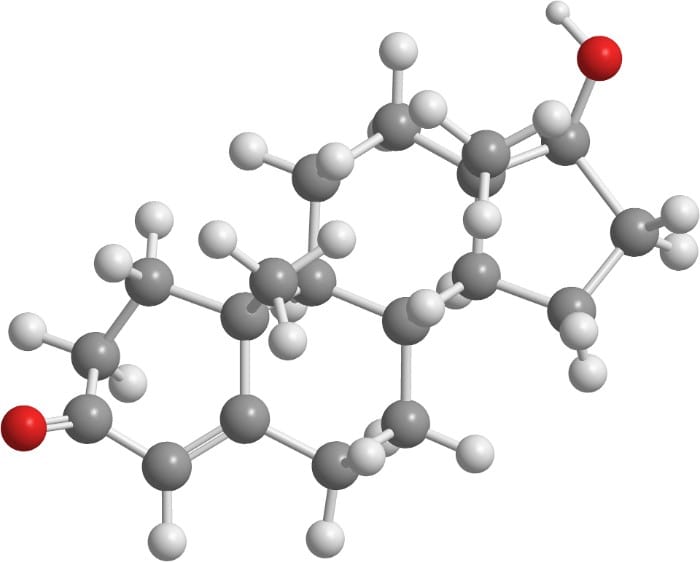Do you feel like you have more energy than everyone else? Do you find yourself constantly wanting to take on new challenges?
If so, it's possible that your testosterone levels are high. In this blog post, we will discuss six signs that indicate high t levels in a man and what they mean for his health and well-being.
We'll also provide some tips on how a man can harness the power of this hormone to live a healthier and happier life!
Let's explore 6 signs of high testosterone in men, what those indications might mean for your health, and how to make the most of elevated testosterone without overdoing it or causing any harm. First, lets take a look at what testosterone is.
What is testosterone?

Testosterone is a powerful hormone primarily found in males (although females have it in smaller amounts) that plays an important role in the development of male reproductive tissues and other sex characteristics.
It helps to build muscle in the male body, burn fat, raise libido levels and give us the drive to take on any challenge head on.
Testosterone levels naturally decrease with age, and low levels of testosterone can cause a range of symptoms including fatigue, decreased sex drive, and depression.
How is Testosterone produced in the body?
Testosterone production occurs in the body by the testes (in males) and by the ovaries and adrenal glands (in females).
In males, the process of testosterone production starts in the hypothalamus, which secretes a hormone called gonadotropin-releasing hormone (GnRH).
This hormone travels to the pituitary gland, where it stimulates the release of follicle-stimulating hormone (FSH) and luteinizing hormone (LH).
LH then travels to the Leydig cells in the testes, where it stimulates the production of testosterone.
Testosterone is then released into the bloodstream and travels to other parts of the body, where it can bind to androgen receptors and carry out its various functions.
In females, testosterone is produced primarily by the ovaries and adrenal glands. The process of testosterone production is similar, but the levels of testosterone are much lower than in males.
What are normal testosterone levels:
The normal range for testosterone levels in adult males varies depending on the laboratory and the method used for measuring.
Generally, the range is between 300 ng/dL and 1000 ng/dL (nanograms per deciliter). However, the range may vary depending on the age, health status, and other factors. It's best to have a blood test for your accurate measurement.
The two main types of the testosterone blood test are:
- Total testosterone: This test measures both free testosterone and attached testosterone in the blood.
- Free testosterone: This test only measures free testosterone.
Testosterone spikes in males and typically peaks in the late teens to early twenties and then gradually declines with age.
Testosterone deficiency levels are typically defined as levels below 300 ng/dL, although this may also depend on the individual's symptoms and other factors.
What are 6 Signs of High Testosterone In A Man?
Increased muscle mass:
Higher t levels have several hallmarks, one of which is increased muscle and strength.
It may come as no surprise that high T lends itself to more impressive physiques than lower testosterone levels, as hormonal cycles that contain higher amounts of the hormone naturally cause the body to build more muscle.
Therefore, a sure sign of elevated testosterone is greater lean muscle mass over time - something that might be noticed in both men and women with higher levels.
Facial Hair Growth:

One of the symptoms of high testosterone in men is increased facial hair and body hair growth.
This hormone helps stimulate production of androgen receptors in the skin, resulting in more active sebaceous glands leading to a darker and fuller beard.
It may also make it easier to begin growing a beard. However, this does not immediately guarantee a full and healthy mane, as diet and lifestyle can also play an important role in facial hair growth too.
Deeper voice:
A deepening of the voice is a common indication of increased t levels in both males and females.
While it may be more noticeable in male voices, a higher concentration of testosterone can result in a more significant change in women’s voices as well.
Hormone Replacement Therapy (HRT) may further enhance the deeper, huskier sound associated with higher testosterone levels.
Understanding the connection between testosterone and vocal depth can not only help men and women better understand how their body’s hormones are functioning, but also serve to provide helpful insight regarding hormone regulation for medical practitioners.
Elevated energy levels:
For those looking to improve their energy levels, an increase in testosterone might be the answer they’re looking for.
Research has shown that natural increases in testosterone can have a significant impact on energy and stamina levels.
That means increased energy, vivacity and alertness throughout the day along with better physical endurance activities.
This naturally occurring hormone within our bodies can help us push through fatigue and work more efficiently while also providing many other beneficial effects, such as improved cognitive function and muscle growth.
If you feel like your energy is low, take a look at your lifestyle and supplement routine to ensure optimal testosterone levels - it could mean the difference between dragging through the day or soaring through it with ease!
Improved libido:
With higher levels of testosterone in the body, not only will you be feeling stronger and more confident, but your libido can get a noticeable boost too.
There is evidence that suggests improved sexual desire and performance - such as better erectile function and faster arousal response - are all associated with higher testosterone concentrations.
If you've been lacking in the bedroom department, it might well be a sign to get the male hormone levels tested to see if they need any kind of adjustment.
Especially when connected with other signs of hormonal imbalances, like fatigue and insomnia, improved libido could be the secret weapon you need to enjoy life - as well as sex - again.
Aggression:
Having too much testosterone can cause a person to manifest many undesirable behaviors such as increased aggression, irritability and mood swings. This is often the not spoken about "dark side" of having high testosterone.
In some cases, these behaviors can be quite significant and have a significant negative impact on the individual's quality of life.
With higher levels of testosterone present due to an increase in production or release in the body, it is common for men to become more aggressive and prone to quick fits of anger or impatience.
In extreme situations, testosterones' presence in the body can lead to violent outbursts and even criminal behavior leading to imprisonment and further risk to society.
It is thus important to recognize the signs of high testosterone so that appropriate steps can be taken in order to manage these symptoms before they progress into more serious consequences.
So those 6 signs of high testosterone are extremely common. Now, let's take a look at what a low testosterone level in a man looks like:
A Low testosterone level can cause a range of symptoms that can impact a man's physical and emotional well-being.
These symptoms can include decreased sex drive or erectile dysfunction, other hormonal imbalances, fatigue or lack of energy, trouble sleeping, sleep apnea, high blood pressure, loss of muscle mass or decreased strength, increased body fat, decreased bone density or osteoporosis, hot flashes or sweating, and mood changes such as depression or irritability.
Additionally, a low testosterone level has been associated with an increased risk of cardiovascular disease, type 2 diabetes, and metabolic syndrome.
If you are experiencing any of these symptoms, it's important to talk to your doctor to discuss getting your testosterone levels checked and to consider treatment options.
Supplementation To Increase Testosterone:
One supplement that has been the most thoroughly studied is D-aspartic acid (DAA), an amino acid that plays a role in the production of testosterone.
Other supplements that may have some evidence of increasing testosterone include fenugreek, ashwagandha, and tribulus terrestris, tongkat ali.
It's important to note that testosterone levels can also be increased by making lifestyle changes such as increasing physical activity, maintaining a healthy weight, reducing stress, and getting enough sleep.
Additionally, testosterone replacement therapy (TRT) under the guidance of a healthcare professional may be an option for men with low testosterone levels.
As with any supplement or treatment, it's important to consult with a healthcare provider before making changes to your health routine.
In addition to D-aspartic acid, fenugreek, ashwagandha, tribulus terrestris, and tongkat ali, there are a few other supplements that may increase testosterone levels in men. These include:
- Vitamin D: This nutrient is essential for the body's production of testosterone, and low levels of vitamin D have been linked to low testosterone levels. Studies suggest that supplementing with vitamin D may increase testosterone levels in men who are deficient in this nutrient.
- Zinc: This mineral is important for the body's production of testosterone, and supplementing with zinc has been shown to increase testosterone levels in men with low levels of this nutrient.
- Magnesium: This mineral is involved in many processes in the body, including the production of testosterone. Studies suggest that supplementing with magnesium may increase testosterone levels in men with low levels of this nutrient.
- DHEA: This hormone is produced by the adrenal glands and is sometimes used to help treat low testosterone levels. However, more research is needed to fully understand its effectiveness and safety.
It's important to note that while some supplements may show promise in increasing testosterone levels, more research is needed to fully understand their effectiveness and safety.
Final Thoughts:
All in all, increased testosterone levels can have a myriad of benefits for the body, from an increase in muscle tissue to improved energy levels, improved libido, and improved motivation for life.
However, it is important to note that too much testosterone can cause intense mood swings and irritability, as well as other issues.
Therefore, it is important to be mindful of how much testosterone you have so that you can make the most out of the positive effects while avoiding any potential downsides.
Understanding what signs may indicate high t levels—from increased muscle mass to facial hair growth and deeper voice– is key in order to take advantage of the advantages while protecting your body from any disadvantages related to this hormone.







